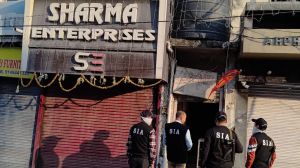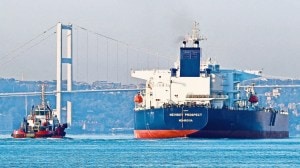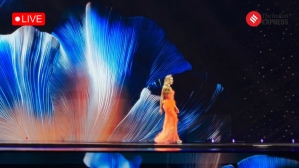Mumbai’s much-awaited sea link in choppy financial waters
Conceived in the 1990s and contracted in year Contractors say they may not be able to continue if the govt does not pay dues...

Conceived in the 1990s and contracted in year 2000, the 5.6-km Bandra-Worli sea link, promising to cut the 40-minute crawl from suburban Mumbai into downtown to a 7-minutes ride is now well and truly in danger of stalling.
Dogged by delays and disputes ever since work began, contractors Hindustan Construction Company (HCC) now says it may not be able to continue work if the government of Maharashtra does not clear pending, disputed dues of over Rs 600 crore.
The numbers are self-explanatory: HCC, contracted by the Maharashtra State Road Development Corporation (MSRDC), says it has spent Rs 889 cr. The original contract value was Rs 400 cr. Payments received by the contractor to date? Rs 248 cr. The difference is locked in disputes over escalating costs brought about by “repeated” changes in design.
HCC is close to throwing in the towel. Says CMD Ajit Gulabchand, “We have now reached an end where we are unable to do more. You can’t go on asking someone to build something without paying the price.” Almost 75 per cent of the design has been altered since the contract was signed, he says.
For the financial capital’s weary motorists, there couldn’t be more depressing news. Of the bevy of “makeover” projects promised by the state government, the Bandra-Worli Sea Link is the only project showing any physical, tangible progress. In over four years since the contract was handed out in 2000, barely five per cent of the construction work could be completed. In the last two years, however, pylons have been erected and concrete segments laid at fever-pace-the bridge is now nearly 60 per cent built.
On his part, Minister for Public Works Anil Deshmukh insists the April 2008 deadline, the latest, will be met. “I am confident,” he says. “These disputes are being resolved following the proper procedure of arbitration. A review of HCC’s claims by project management consultant Dar is currently on. The deadline for that is July 31,” he says.
“They will arrive at a sum and if HCC is still not satisfied, there is an appeals committee too. There is no problem from our side at all.”
Mired in delays right after the contract was signed on October 1, 2000, the construction site area on the Bandra side itself was handed over to HCC only May 2001, seven months after the contract was awarded. Then there were the changes in the bridge plan, setting the course for a series of disputes over cost escalations.
First, the alignment at Worli side was changed-moved 150 metres into the sea to accommodate the demands of local fishermen. “For HCC this meant a change in equipment. The rock formation on the Bandra side, called ‘fractured bracia’ were 40 mpa (mega pascal) in strength. Whereas, the new alignment on the Worli side meant we had to deal with ‘basalt’ rock of more than 100 mpa,” says project chief engineer D K Sharma.
HCC submitted the cost implications of this change to the MSRDC-appointed project management consultants, Sverdrup, in July 22. Sverdrup rejected the claims forcing HCC to approach the Technical Advisory Committee (TAC). The TAC reviewed this and other pending issues for three months from September 2002, but couldn’t suggest a way out. In December 2002, the matter reached a special committee set up to negotiate the cost escalations. After another two months of debate, a deal was struck.
But two other major changes were included: One, the Bandra cable-stayed bridge, to be Mumbai’s first and an iconic design, was altered from a single tower, eight-lane bridge to a double tower, two four-lane bridges. Two, a second, smaller cable stayed bridge was introduced at Worli.
On February 14, 2003 both parties agreed to a further cost hike. But by June 2003, MSRDC cancelled the agreement. It was a tit-for-tat reaction to HCC not agreeing to MSRDC’s new engineer, Dar Consultants, saying the appointment had been made without implementing the agreed points of the latest agreement.
By October 2003, HCC was ready with its revised rate—Rs 815 cr. In March 2004, MSRDC quoted Rs 600 cr. More discussions followed and ultimately, in July 2004, both parties agreed to Rs 694 cr, although with riders that included a fresh deadline of 48 months from 31 March 2004, ie April 2008.
But by April 2006, there were fresh problems. Dar proposed Rs 553 cr as against HCC’s Rs 694 cr. And this is where talks are stuck. Deshmukh says regular monthly payments are indeed going out to HCC. The claims only pertain to additional or escalated costs, which will be settled eventually once the bills are approved by Dar.
But the HCC CMD believes it’s time for the government to sit up and sort out the issues on a war footing. “I am not threatening stoppage… I am only saying we will be rendered disabled.” April 2008? Looks a long way off.





- 01
- 02
- 03
- 04
- 05


























